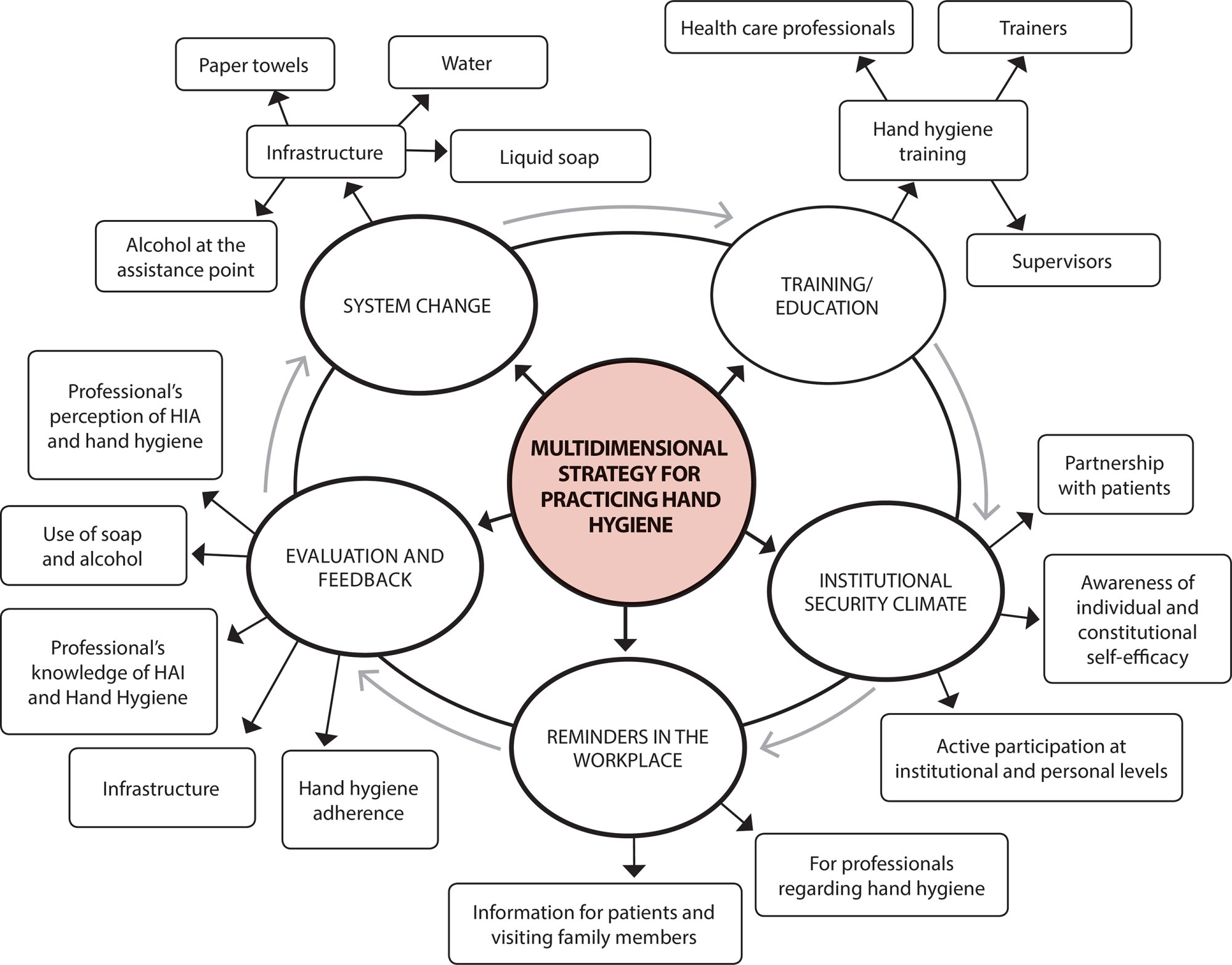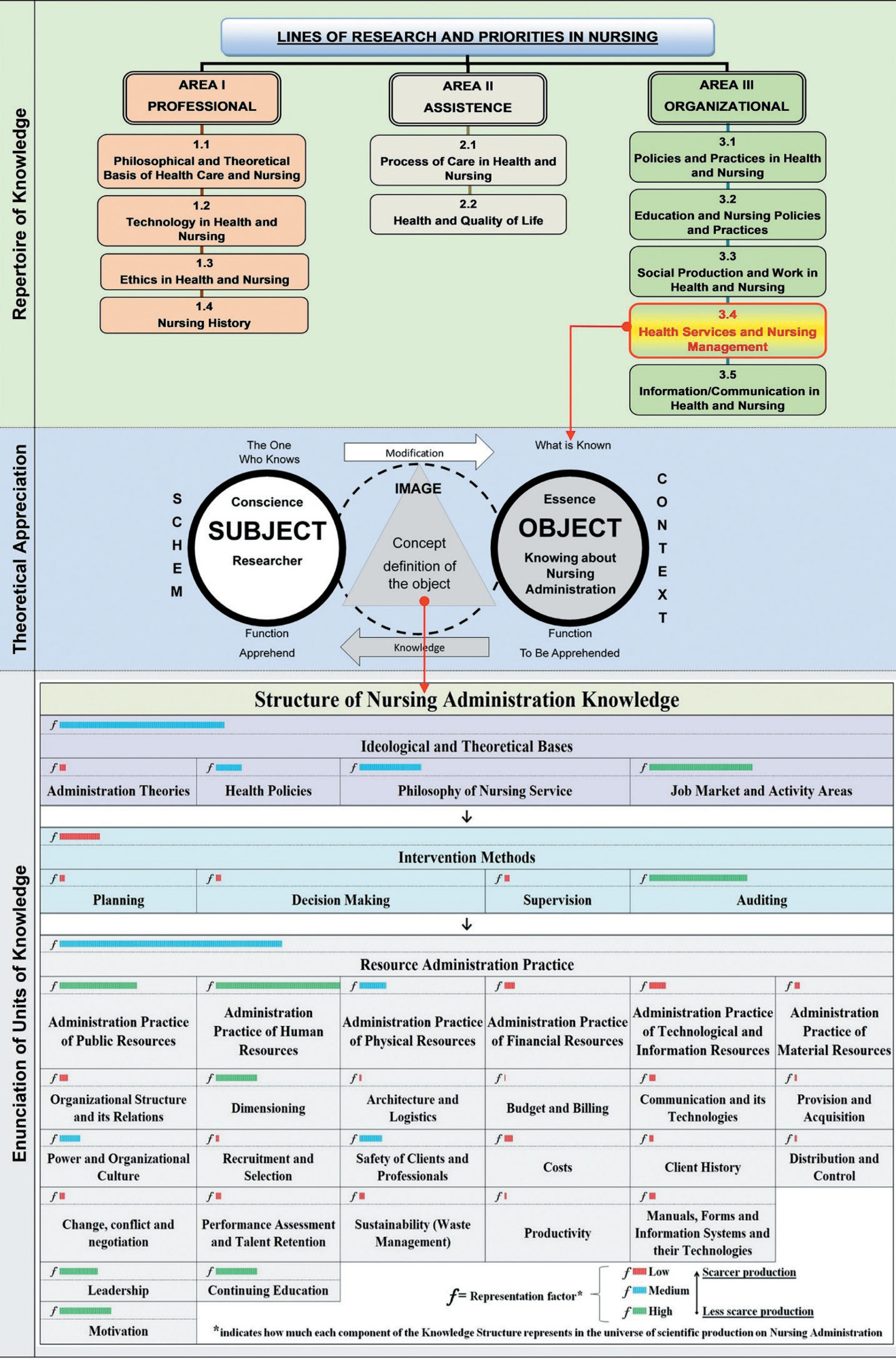-
REFLECTION10-26-2020
Multimodal strategy for hand hygiene in field hospitals of COVID-19
Revista Brasileira de Enfermagem. 2020;73:e20200487
Abstract
REFLECTIONMultimodal strategy for hand hygiene in field hospitals of COVID-19
Revista Brasileira de Enfermagem. 2020;73:e20200487
DOI 10.1590/0034-7167-2020-0487
Views0See moreABSTRACT
Objective:
Reflect and propose adaptations to the Multimodal Hand Hygiene Strategy for field hospitals, in the context of the COVID-19 pandemic.
Method:
Reflective study, carried out in April 2020, based on the recommendations of the World Health Organization and the guide for the implementation of the five components of the Multimodal Strategy: system change related to infrastructure; training/education; evaluation and feedback; reminders in the workplace; and institutional security climate.
Results:
The Multimodal Strategy, proposed for hospitals in general, can be adapted for field hospitals in order to reduce the transmission of the SARS-CoV-2 virus. Investments to adapt the infrastructure and education of workers require foresight and speed and are of special relevance to promote hand hygiene in this care context.
Final considerations:
Adjusting the Multimodal Strategy, especially for the reduced time in the execution of each component, is necessary for field hospitals with a view to preventing COVID-19.

-
REFLECTION10-26-2020
Nursing education: challenges and perspectives in times of the COVID-19 pandemic
Revista Brasileira de Enfermagem. 2020;73:e20200683
Abstract
REFLECTIONNursing education: challenges and perspectives in times of the COVID-19 pandemic
Revista Brasileira de Enfermagem. 2020;73:e20200683
DOI 10.1590/0034-7167-2020-0683
Views0See moreABSTRACT
Objective:
To discuss the challenges and perspectives of nursing education in times of the COVID-19 pandemic.
Methods:
Reflection study, with theoretical approach based on national and international publications, allied to the experience of researchers in the area of nursing education.
Results:
Four sections are identified: Nursing education: current affairs and perspectives; Education and technologies in time of pandemic: acceleration, alteration and paralysis; Difference between emergency, intentional and remote teaching; the return to the “new normality”: new structuring axes and legal norms.
Final considerations:
The conclusion is that longstanding challenges have emerged with the pandemic, and the processes of acceleration, change and paralysis have marked education in these times. Moreover, epidemiological, technological and psychological aspects should be more valued in the return to activities.
-
REFLECTION10-19-2020
Contributions of Florence Nightingale as a social entrepreneur: from modern to contemporary nursing
Revista Brasileira de Enfermagem. 2020;73:e20200064
Abstract
REFLECTIONContributions of Florence Nightingale as a social entrepreneur: from modern to contemporary nursing
Revista Brasileira de Enfermagem. 2020;73:e20200064
DOI 10.1590/0034-7167-2020-0064
Views0See moreABSTRACT
Objective:
To reflect on the transformations of modern and contemporary nursing as well as on Florence Nightingale’s social entrepreneurship.
Method:
This is a logical-reflective exhibition, with an emphasis on the theoretical assumptions of social entrepreneurship and the legacy of Florence Nightingale, from modern to contemporary nursing, based on readings of texts extracted from electronic databases, especially periodicals, books and theses.
Results:
The logical-reflective exhibition focuses on two fundamental aspects: 1) Florence Nightingale’s legacy as a social entrepreneur; 2) The evolution of Brazilian nursing: from modernity to contemporaneity.
Final considerations:
Florence Nightingale’s legacy is undeniable with regard to the evolution of modern and contemporary nursing and transcends different areas of knowledge. In addition to being a precursor to modern nursing, it is distinguished by its visionary attitude, humanitarian social value and potential for transforming the paths and realities present in the Contemporary Era.
-
REFLECTION09-30-2020
Reality or utopia: eradication of the AIDS epidemic in Guinea-Bissau by 2030
Revista Brasileira de Enfermagem. 2020;73:e20190137
Abstract
REFLECTIONReality or utopia: eradication of the AIDS epidemic in Guinea-Bissau by 2030
Revista Brasileira de Enfermagem. 2020;73:e20190137
DOI 10.1590/0034-7167-2019-0137-2019-0137
Views0See moreABSTRACT
Objectives:
to reflect on the implementation of an integrated strategy to eradicate the Acquired Immunodeficiency Syndrome (AIDS) epidemic in Guinea-Bissau by 2030.
Methods:
a reflective study.
Reflection:
Guinea-Bissau is a Portuguese-speaking country located in Sub-Saharan Africa, in constant political and economic instability. Among its characteristics are sociocultural diversity and high rates of morbidity and mortality from causes related to infection by the Human Immunodeficiency Virus. In the quest to eradicate the AIDS epidemic by 2030, instituted especially by the United Nations, it is noted that political and socio-cultural factors transformed eradication of the AIDS epidemic by 2030 into a utopia.
Final Considerations:
international strategies, although ambitious, are considered opportunities for countries to propose and build public policies capable of changing the existing reality.
-
REFLECTION09-30-2020
Evidence on Nursing Administration Epistemology
Revista Brasileira de Enfermagem. 2020;73:e20190275
Abstract
REFLECTIONEvidence on Nursing Administration Epistemology
Revista Brasileira de Enfermagem. 2020;73:e20190275
DOI 10.1590/0034-7167-2019-0275
Views0See moreABSTRACT
Objective:
Reflecting critically on the epistemological aspects of the of knowledge construction on Nursing Administration in Brazil.
Methods:
This is an article of theoretical reflection that aims to assess the epistemological aspects of the construction of knowledge about Nursing Administration.
Results:
The knowledge about Nursing Administration has a long way to go, as its epistemological repertoire is still timid. In addition, the lack of distinction of this knowledge in the communication of research products underestimates the production on Nursing Administration, as these products appear diluted in other areas of Nursing (care, research, and teaching).
Final considerations:
Due to the reflections, the need for new scientific evidence is highlighted, whose formulation of research questions can contribute to the delineation of phenomena that distinguish Nursing Administration as an area of research knowledge.

-
REFLECTION09-21-2020
Connections and interlocations between self-image, self-esteem, active sexuality, and quality of life in ageing
Revista Brasileira de Enfermagem. 2020;73:e20190592
Abstract
REFLECTIONConnections and interlocations between self-image, self-esteem, active sexuality, and quality of life in ageing
Revista Brasileira de Enfermagem. 2020;73:e20190592
DOI 10.1590/0034-7167-2019-0592
Views0See moreABSTRACT
Objective:
to reflect on the connection between self-image, self-esteem, active sexuality, and quality of life in ageing; identify which measurement instruments in Brazilian and international literature interconnectively address the connections referred to in the general objective.
Method:
a theoretical-reflexive essay.
Results:
the reflection was described in the guiding axes: Connections between self-image, self-esteem, active sexuality, and quality of life in ageing; Interlocutions and instruments for measuring the connection between sexuality and ageing. Instruments in Brazilian and international literature are unable to address this topic in an interconnected way. Limitations and disadvantages of application with elderly individuals are presented.
Final considerations:
carrying out qualitative research and validating quantitative instruments that show connections and interlocutions, without stigmas and reprimands, common in this age group, should be encouraged in the scientific field and in social spaces.
-
REFLECTION09-18-2020
New Coronavirus: (Re)thinking the care process in Primary Health and Nursing
Revista Brasileira de Enfermagem. 2020;73:e20200256
Abstract
REFLECTIONNew Coronavirus: (Re)thinking the care process in Primary Health and Nursing
Revista Brasileira de Enfermagem. 2020;73:e20200256
DOI 10.1590/0034-7167-2020-0256
Views0See moreABSTRACT
Objective:
to reflect on the challenges and power of the nursing care process in Primary Health Care in the face of the New Coronavirus, COVID-19, in the Brazilian scenario.
Method:
reflective study, based on the discursive formulation in the context of COVID-19 in Primary Health Care, based on theoretical foundations and practical effects of neoliberal policy, the care process, and Nursing.
Results:
in Brazil, COVID-19, has caused the need for challenges for strengthening primary care in the face of neoliberal policy, but it presents the potential of dialogue with communities and the (re)creation of the nursing care process through solidary collaborative networks.
Final considerations:
reflecting on the nursing care process in primary care restores the strength present in the cooperation between health teams and community solidarity networks to change social and health circumstances, despite the challenge imposed by underfunding aggravated by neoliberalism.
-
REFLECTION09-07-2020
Public health nursing: regulation and public health policies
Revista Brasileira de Enfermagem. 2020;73(6):e20190550
Abstract
REFLECTIONPublic health nursing: regulation and public health policies
Revista Brasileira de Enfermagem. 2020;73(6):e20190550
DOI 10.1590/0034-7167-2019-0550
Views0See moreABSTRACT
Objective:
To analyze regulation and public policies related to nursing and the specialist nurse in community and public health nursing.
Methods:
Analysis of the legal and normative framework of community and public health nursing in Portugal, as well as current public health policies, regarding the competences and intervention of this nurse, articulated with the attributions of the Public Health Unit.
Results:
The intervention of this nurse deserves a broad reflection, in the sense of maximizing the activities of community and public health, essential for the implementation of public policies and obtaining health gains.
Final considerations:
This nurse has competences foreseen in the regulations and standards for public health interventions, in line with the attributions of the Public Health Unit, of the National Health Service, in which specialties are identified for their performance in the current structure.



